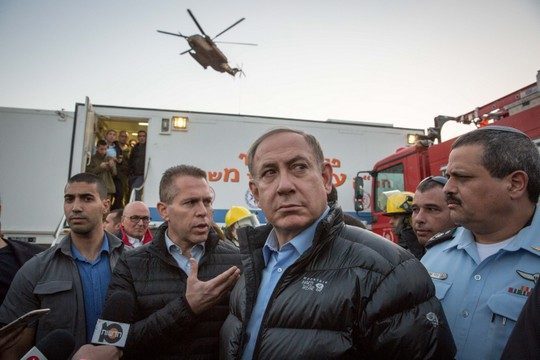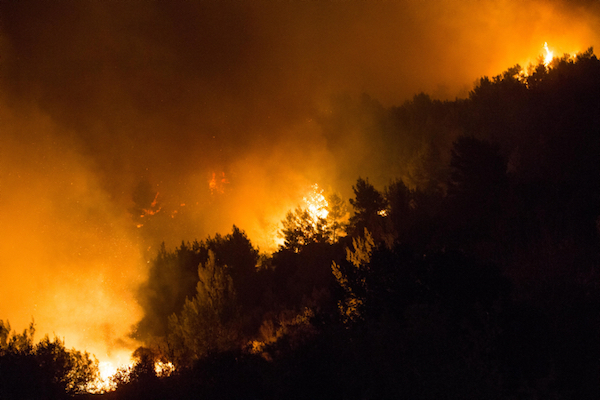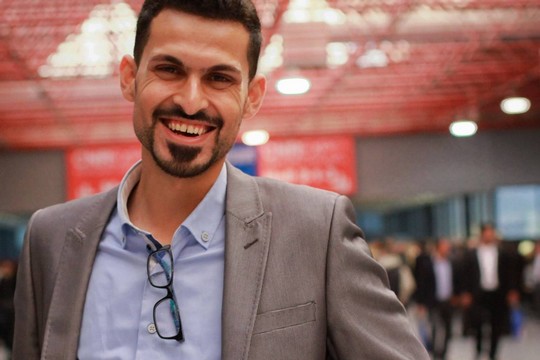The Israeli media and politicians’ narrative of a Palestinian ‘arson intifada’ remains in place, despite there not being even a shred of evidence to support their story.

Over the last couple of days several people have sent me an article by Kalman Liebskind from last Friday’s Ma’ariv newspaper, which cited statistics from Israel’s Fire and Rescue Services on the wave of fires that swept Israel at the end of November. The piece claimed that almost all the fires investigated by the authorities were due to arson. Given how I wrote at the time that there were no known facts to suggest that the fires were entirely — or even mostly — due to a “fire intifada” or “arson terror,” as they were being dubbed by Israeli politicians and the media, people wanted to know my thoughts on the latest figures. So I thought it would be worthwhile setting a few things straight.
First of all, I didn’t say at the time, nor am I claiming now, that there are not and have never been cases of nationalistic arson. It’s absolutely possible that there have been, and in certain instances (almost all of them over the Green Line, in the occupied Palestinian territories that are under a military regime) it’s very likely that nationalistic arson has occurred.
But as of now, there is not even a single person who has been arrested and charged with nationalistic arson, there is no clear evidence of such activity, and no one who was arrested and indicted on arson charges (all of them Arabs, by the way), is suspected of acting out of nationalistic motives. The new statistics published in the Ma’ariv article don’t change any of this.
Let’s look at the figures themselves — which, it must be noted, are still not sufficiently clear. The article talks about 71 incidents of arson that were investigated, out of 80. But what proportion of the fires did these 80 cases of arson represent? Wikipedia says that there were over 1,700 fires in Israel during that period, so 80 is a rather small minority. A figure of 39 large fires was mentioned in Ha’aretz last week, but how many lesser fires were there? (By the way, Ha’aretz revealed last week that in response to a freedom of information request to the Fire and Rescue Services, they were told there is still no final report on the wave of fires. Yet Liebskind seems to have the conclusive dossier.)

Israeli officials have thrown out varying figures over the last two months, and it’s still not clear how many fires we’re talking about and whether they were large, medium or small. We still don’t know exactly what percentage has been investigated, what caused the fires, how many took place in the occupied territories and how many inside Israel. We also don’t know how many fires were lit before and after Prime Minister Benjamin Netanyahu cried “arson terrorism” (a declaration which, according to Police Chief Roni Alsheikh, became a self-fulfilling prophecy).
No evidence of nationalistic arson
Still, 71 fires is a lot. But as we have learned from the arrests that did take place and the indictments that were submitted, people set fire to all sorts of things for all sorts of reasons. Ali Mahajneh, the last of those to be arrested on suspicion of arson to be released last week, set fire to piles of garbage in his town, Umm el-Fahm — in protest, he says, at the fact that the trash isn’t collected. There is no suggestion that the arson in his neighborhood was nationalistically-motivated.
Two youths from Jadida-Makar and three from Deir Hanna were indicted for setting fires in woodlands in their areas, which sounded like a combination of pyromania and a “prank,” according to how the judge in one of the cases described it. One way or another, the prosecutor didn’t find any grounds on which to claim nationalistic arson.
One man was arrested next to Battir in the West Bank and interrogated for several days by the Shin Bet, after filming himself lighting a fire — until it transpired that he was merely burning weeds on his land, and that he also put the fire out.
That’s all the serious arrests there were (not including those who were arrested and released after it turned out that they had nothing to do with the fires. They, too, were all Arabs). Plus, of course, there was the arrest of Anas Abudaabes, who was suspected of inciting arson when he had in fact written a satirical post criticizing those who were celebrating the fires.

As I wrote above, we’ve learned something that I, at least, didn’t know beforehand — that there are people who set fire to things as a matter of routine. Tree clippings, garbage, and even just twigs in order to see something on fire, big or small. And perhaps that really is a problem. Certainly, given the extreme weather we saw in Israel at the end of November and the warnings from the fire services that accompanied it, the people responsible for setting these fires should be put on trial and punished (that includes the police officers who shot flares that led to fires in Beit Meir, the farmers who burned trimmings in Kiryat Gat, the soldier who threw down a cigarette in Neve Yair, and more).
There is not even a shred of evidence of coordinated, malicious, nationalistic arson here. Or even of an uncoordinated wave of arson attacks. It’s still possible that the Shin Bet will, through wiretaps, surveillance and interrogation using “special techniques,” uncover some cell that intentionally started fires in Jewish neighborhoods of Haifa and Zichron Ya’akov for nationalistic reasons.
But the question is what can and cannot be determined from what happened. Unlike with the series of stabbing and ramming attacks by Palestinians against Jews, and the array of incidents in which Israeli soldiers killed Palestinians with no justification, we cannot currently state that what happened in November involved nationalistic arson.
One last thing: as long as there are no established facts that point to a wave of nationalist arson attacks, the most important question remains that of the story politicians and newspapers told at the end of November, without being in possession of the stats.
The reality is that as the fires burned, Jewish and Arab citizens as one had to tackle the flames in their communities, who were called on together to put out the blazes and take in refugees from the fires, and who stood side-by-side during the crisis. But the story Netanyahu and the media gladly and eagerly told — of Jews who had fallen victim to Arab terror attacks by fire — was one-sided, distorted and without any basis in fact. And as of yet, no one has been held accountable.
This piece was originally published in Hebrew on Local Call. Read it here. Translated by Natasha Roth.


